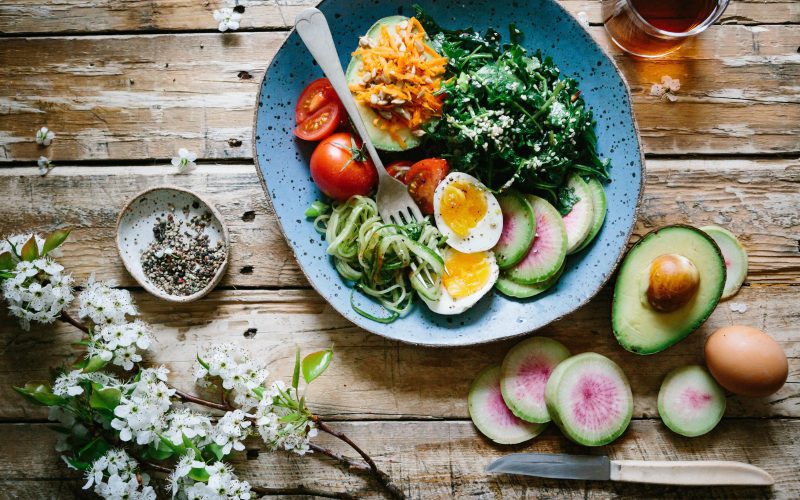Are you tired of looking in the mirror and seeing blemishes, wrinkles, and other signs of skin aging? If so, it’s time to start paying attention to what you’re putting in your body. Believe it or not, what you eat can have a major impact on the health and appearance of your skin. In this blog post, we’ll explore how eating right can transform your skin from acne-ridden to glowing with vitality. Get ready to unleash your inner radiance!
The Different Types of Skin
There are four main types of skin: normal, dry, oily, and combination. Within these categories, there are countless subtypes and variations. However, understanding your skin type is a helpful first step in finding the right skincare routine for you.
Normal skin is well-balanced and not particularly prone to breakouts or other issues. If you have normal skin, you’re lucky! You can pretty much use any type of skincare product without fear of it causing problems. Just be sure to cleanse and moisturize regularly to keep your skin healthy and happy.
Dry skin feels tight, rough, and may even appear scaly. If you have dry skin, it’s important to use products that will hydrate and nourish your skin without stripping it of its natural oils. Look for products with hyaluronic acid or glycerin, and avoid those with alcohol or other harsh ingredients.
Oily skin is characterized by large pores, a shiny complexion, and frequent breakouts. If you have oily skin, it’s important to find a balance between cleansing and moisturizing. Over-washing can strip your skin of its natural oils, leading to even more oil production. On the other hand, not washing enough can cause build-up that leads to breakouts. Look for products specifically designed for oily skin, and make sure to cleanse your face twice a day.
Combination skin is… well
How Diet Impacts Skin Health
Good skin health starts with a healthy diet. What you eat can impact your skin in a number of ways, both good and bad. Eating foods that are high in antioxidants, for example, can help to protect your skin from damage caused by free radicals. Free radicals are unstable molecules that can cause cell damage, and are one of the main causes of premature aging. Antioxidants work to neutralize free radicals, helping to keep your skin looking young and healthy.
In addition to eating foods high in antioxidants, you should also aim to eat plenty of fruits and vegetables. These foods are packed with vitamins and minerals that are essential for healthy skin. Vitamins C and E, for example, are both important for maintaining healthy skin cells. Zinc is another nutrient that is important for healthy skin, as it helps to keep the skin barrier strong and protects against environmental damage.
Of course, you should also be sure to stay hydrated by drinking plenty of water each day. Water helps to keep the entire body (including the skin) hydrated and functioning properly. When you aren’t properly hydrated, your skin can become dry and lackluster.
So, if you want to have healthier, younger-looking skin, be sure to focus on eating a healthy diet full of antioxidants, vitamins, minerals, and water.
The Best Foods for Healthy Skin
When it comes to your skin, what you eat is just as important as what you put on it. In fact, “you are what you eat” is especially true when it comes to your complexion. Eating the right foods can help clear up acne, prevent premature aging, and even make your skin look and feel more radiant. Here are some of the best foods for healthy skin:
1. Salmon: This powerhouse food is packed with omega-3 fatty acids, which are essential for maintaining moisture in the skin. Omega-3s also help reduce inflammation, which can lead to breakouts.
2. Avocados: Another great source of healthy fats, avocados also contain vitamins C and E, both of which are important for protecting the skin from damage caused by free radicals.
3. Sweet potatoes: These starchy vegetables are rich in beta-carotene, a precursor to vitamin A. Vitamin A is essential for cell turnover and keeping the skin looking youthful and radiant.
4. Tomatoes: Tomatoes are loaded with lycopene, an antioxidant that helps protect the skin from damage caused by UV rays. Lycopene is especially effective at preventing sunburns and reducing the risk of developing skin cancer.
5. Green tea: Green tea is full of antioxidants that help neutralize free radicals that can damage the skin. Green tea can also help improve circulation and reduce inflammation
The Worst Foods for Healthy Skin
There are certain foods that can have a negative impact on your skin health, regardless of your skin type. These “worst foods for healthy skin” can contribute to breakouts, premature aging, and other skin problems.
1. Refined carbs: Refined carbs like white bread and pasta can cause inflammation in the body, which can lead to acne and other skin problems.
2. Sugar: Sugar can damage collagen and elastin, two proteins that keep skin firm and elastic. It can also cause glycation, a process that leads to the formation of advanced glycation end products (AGEs), which damage cells and contribute to wrinkles.
3. Dairy: Dairy products like milk and cheese contain hormones that can trigger acne breakouts. They also tend to be high in saturated fat, which can clog pores and lead to blackheads and whiteheads.
4. Alcohol: Alcohol dehydrates the body and dries out the skin. It also dilates blood vessels, which can cause redness and puffiness.
5. Caffeine: Caffeine is a diuretic, which means it causes the body to lose water. This can lead to dehydration and dry skin.
Recipes for Glowing Skin
If you want to know how to get clear, glowing skin, you need to understand a little bit about how your skin works. Your skin is your body’s largest organ, and it’s made up of three main layers: the epidermis (outer layer), the dermis (middle layer), and the subcutis (inner layer). The epidermis is mostly made up of dead skin cells that protect your body from the outside world. The dermis is where you’ll find your blood vessels, sweat glands, and hair follicles. And the subcutis is made up of fat and connective tissue.
Now that we’ve got a quick 101 on skin anatomy, let’s talk about how what you eat affects your skin health. Eating a diet that’s high in processed foods, sugar, and unhealthy fats can take a toll on your complexion. But eating plenty of fresh fruits and vegetables, lean protein, and healthy fats can help give you beautiful, radiant skin.
Here are some specific recipes for glowing skin:
1. Salmon with Avocado Salsa – Salmon is a great source of omega-3 fatty acids, which are essential for maintaining healthy skin cell membranes. These fatty acids help keep your skin hydrated and looking plump and youthful. The avocado salsa in this recipe provides a boost of antioxidants that can help protect your skin from damage caused by free radicals.
2.
DIY Skincare Tips
There are a million and one skincare tips out there, but not all of them are created equal. When it comes to taking care of your skin, there is no one-size-fits-all approach – what works for someone else might not work for you. However, there are some general DIY skincare tips that can help improve the appearance of your skin, no matter what your specific concerns may be.
One simple DIY skincare tip is to make sure you are drinking enough water every day. Staying hydrated helps keep your skin cells plump and supple, which can help reduce the appearance of fine lines and wrinkles. aim to drink eight glasses of water per day, or more if you can.
In addition to drinking plenty of water, you also need to make sure you are eating a healthy diet. Eating foods that are rich in antioxidants can help protect your skin from free radical damage, which can lead to premature aging. Include plenty of fresh fruits and vegetables in your diet, as well as whole grains and lean proteins.
Finally, don’t forget about the importance of using sunscreen every day, even when it’s cloudy outside. Ultraviolet rays can penetrate through clouds, so it’s important to apply sunscreen year-round to protect your skin from sun damage. Look for a sunscreen with an SPF of at least 30 and reapply it every two hours when you’re outdoors.
Conclusion
Eating right is essential in order to maintain healthy, glowing skin. From fighting acne to preventing premature signs of aging, the right diet can be incredibly effective at keeping your skin looking gorgeous and youthful. With this knowledge, you are now empowered with the tools needed to make savvy dietary choices that will benefit your skin health. So go on and enjoy a variety of nourishing foods full of vitamins, minerals and antioxidants – your skin will thank you for it!












